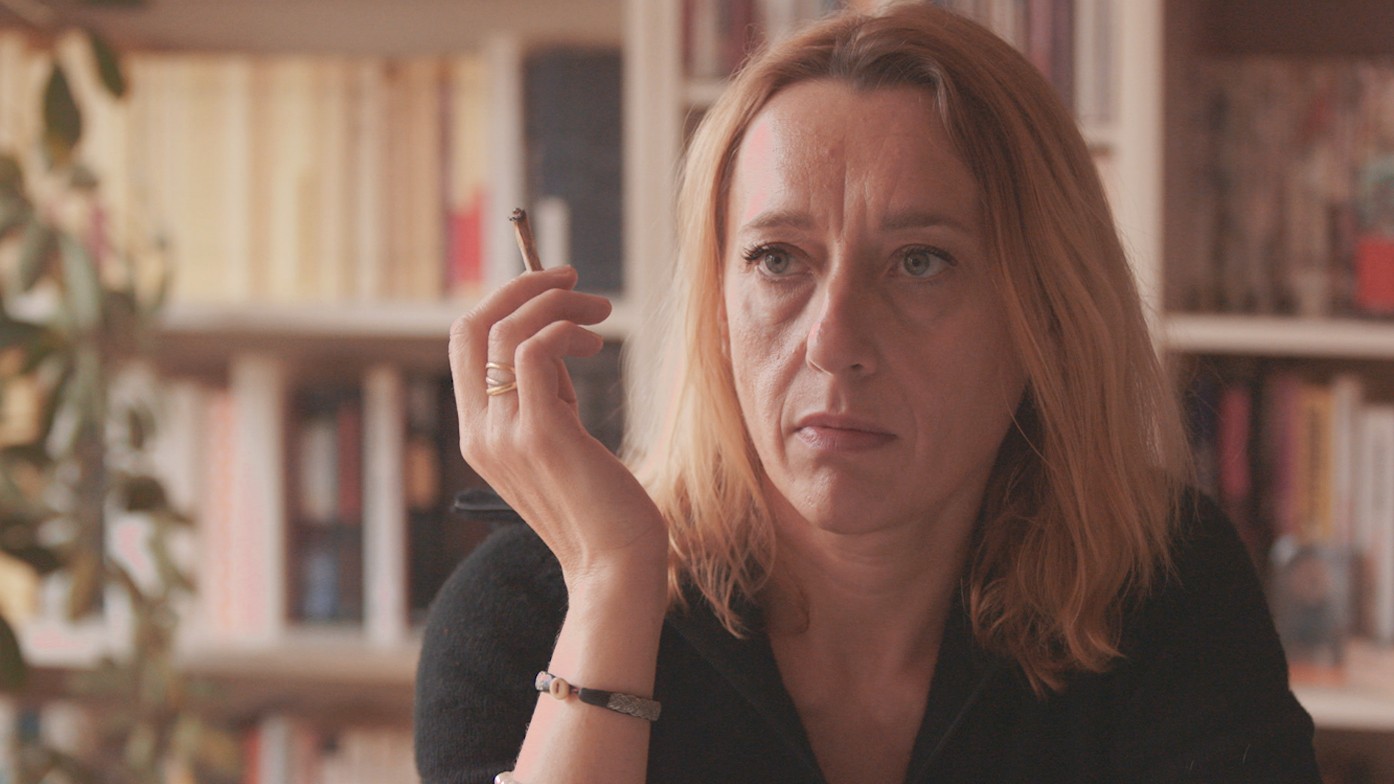For a book called Hunger, the physical sensation doesn't actually appear too frequently in the pages of Roxane Gay's new memoir. To Gay, hunger is a spiritual or emotional state, the intersection of fear and desire made visible, and throughout the book she uses it as a metaphor to link the emotional states that erupt from self-hate: isolation, self-destruction, a tolerance for abuse, and deep sadness. This relationship to hunger began when she was a student at a boarding high school: She would eat when she felt sad or lonely. Eating was connected with shame, and family dinners tinged with the disappointment of being the outcast in a lithe, thin family. The child of upper-middle class Haitian immigrants, Gay moved through rarefied spaces before dropping out of Yale as a sophomore and running away, choosing poverty and working on a phone-sex hotline.Hunger is, as the subtitle ("A Memoir of (My) Body") implies, a memoir about having a body, and what it means to have one that doesn't fit into the regular bounds of society. Late in the book, Gay writes of the dislocation she sees on the faces of people who did not realize that she is fat before booking her for a reading or lecture. "They don't know how to hide their shock when they realize that a reasonably successful writer is this overweight," she writes. That's not to say that this is ideal text for the Fat Acceptance Movement. On Hunger's release day, Mamamia, an Australian podcast, posted an interview with Gay with an introduction describing how difficult it was for them to get a sturdy chair and how the host, Mia Freedman, emailed with Gay's publicist to ensure Gay could fit in the elevator. Freedman said she wasn't comfortable calling Gay "fat" but was more comfortable with the medical term Gay pokes fun of and dismisses in Hunger, "super morbidly obese."She gives a tidy answer: She ate to protect herself after a brutal assault in adolescence. After an extended introduction, Gay describes with austerity a violent sexual assault she suffered at the age of 12. It cleaved her life into before and after: She was thin, open, and strong before, but fat, traumatized, and broken after. Gay has always mined her personal history for material without looking for pity or absolution from her reader, and while her spare, utilitarian prose could be conspicuously undecorated in her recent collection of stories Difficult Women, here it helps her avoid melodrama and the fundamental fallacy of writing about sexual violence: more detail equals more realism equals more importance, which you can see anywhere from Hanya Yanagihara's novel A Little Life to the now discredited Rolling Stone story about sexual assault at UVA. Gay writes, "And I finally did say no. And it did not matter. That's what has scared me the most. My no did not matter. I wish I could tell you I never spoke to Christopher again, but I did."
Watch: Virginie Despentes on Killing Rapists
A scientist or a pedant would argue that Gay's self-diagnosis isn't completely believable, if only because we, as humans, have a lot less control over our appetites and what our bodies choose to do with food than free will can explain. But it functions as a nice organizing principle for the book. A reader comes to understand that Gay is both "at fault" and "not at fault" for her body, so the expectations for what comes next are subtly shifted. We don't really have an expectation that she will lose the weight, if only because we know she can't go back in time and stop the assault. Her insistence on that fact—gaining weight is something that she did—makes Hunger about acceptance instead of redemption, which can be blinding when we're taking about weight loss.Now that obesity is something we describe as a "public health epidemic," health has become an excuse to criticize the bodies of strangers, but Gay refuses this frame for her own story. She notes that she has high-blood pressure, and had difficulty recovering from a broken ankle, but medical concerns are largely off the table here. What she talks about instead is how physically uncomfortable and emotionally bruised she can be—at restaurants, say, or on planes. The book moves between her personal history and the everyday reality of having her body in her life, and the switches come constantly and can be jarring. One moment you'll be reading about Gay's admiration for Ina Garten, the celebrity chef and Barefoot Contessa, and the next you'll find yourself in a deep exploration of an abusive relationship. But they cohere to make an argument: Living in a fat body means you whiplash between those two states all the time. For Gay, her body is at once a jagged emotional wound and a banal but ever-present inconvenience brought on by the small-mindedness of others.
Advertisement
Understandably, Gay was very angry. A constant refrain of the book is how difficult just writing about her body was for her. She isn't interested in empowerment, or even a message a reader can take away, but rather making some meaning out of the things that have happened to her. Instead of a straightforward manifesto, Hunger is a discursive take on a small question: How did I become this person?Read more: 'I Love Dick' and the Narcissism of Romantic Obsession
Advertisement
Watch: Virginie Despentes on Killing Rapists

A scientist or a pedant would argue that Gay's self-diagnosis isn't completely believable, if only because we, as humans, have a lot less control over our appetites and what our bodies choose to do with food than free will can explain. But it functions as a nice organizing principle for the book. A reader comes to understand that Gay is both "at fault" and "not at fault" for her body, so the expectations for what comes next are subtly shifted. We don't really have an expectation that she will lose the weight, if only because we know she can't go back in time and stop the assault. Her insistence on that fact—gaining weight is something that she did—makes Hunger about acceptance instead of redemption, which can be blinding when we're taking about weight loss.
Advertisement
The book rests on the fact that we're reading the reminiscences, trials, and triumphs of a fairly famous and successful person, and its true narrative is Gay's transformation from teenager gripped by trauma to adult who has reached some emotional equilibrium. It's an interesting twist on an American Dream story—less about what a person does to achieve success and more about the things that hard work and talent can't necessarily fix.Gay rose to prominence because of how accessible her essay collection Bad Feminist was, and she doesn't abandon her readable, even bloggy, style here. In a mixed review of Bad Feminist, writer Alice Gregory wrote that Gay's argument, that ideological purity is impossible and ill-advised for feminists in the 21st century, because feminists are human and thus fallible, "was reasonable, if overly reliant on an unreasonable straw man." That straw man—the idea that everyone else is rejecting nuance, but Gay herself is embracing it—is all over Gay's writing. Because of her spare prose style, Gay has a tendency to reduce the views of her opponents or adversaries to unnecessary simplicity, and she is equally prone to making totalizing statements about herself, her likes and dislikes, and how other people see her. As a result, she often ends up being the one rejecting nuance. But it's more forgivable in Hunger—she is dealing with the tangible facts of her life. Midway through the book, she recounts a funny run-in with a thin woman on an elliptical at the gym, and they engage in a non-verbal battle about who can pedal the longest. For the sake of the story, Gay ascribes more agency and malice to this woman than is realistic—we have no way of knowing if she took the "competition" seriously, too, even if she did make a snide comment about Gay's weight. But it illustrates the way that persecution complexes are often borne of being persecuted, and Gay negotiates both throughout her memoir.It's an interesting twist on an American Dream story—less about what a person does to achieve success and more about the things that hard work and talent can't necessarily fix.
In many ways, this filter is unique—as Hunger makes clear, Gay has seen more of America, across divides of race, class, and geography, than most people, and she is aware of her agency and her advantages. But at the same time, she knows she's part of a system. When discussing the aftermath of her assault, Gay notes, "I am not special. I am one woman who has experienced something countless women have experienced. I am a victim who survived." While the validity of that assessment is depressing at best, it's nevertheless nice to live in a world where Roxane Gay is famous. I'm happy to see her on the New York Times op-ed page because she is an adamant voice for the world most others either ignore or fetishize, and Hunger shines when she focuses on the conditions, whether systemic or personal, that have created that world. Hunger is full of close-up looks at what it feels take a body that some people refuse to understand, and what it takes to build a world where you can fit.
